Losing Justice Hobbs, Western Water Expert and Valued Mentor
When former Colorado Supreme Court Justice Gregory J. Hobbs passed away recently, just weeks shy of his 77th birthday, he left a gaping hole in the hearts of many. Not just family and close friends. But people across the Colorado legal community, the broader Western water community, and a far-flung network that includes Berkeley Law staff, faculty, and alumni.
Long-term connections with Berkeley Law
Justice Hobbs’ connections with Berkeley Law run deep. He got his JD here in 1971. He and his wife Bobbie had their first child while he was in law school.
In 2006, Berkeley Law Professor Joe Sax—widely recognized as one of the founders of the field of Environmental Law—introduced Justice Hobbs as, “beyond dispute, one of the most knowledgeable and most accomplished experts on water law anywhere in the United States.” (Watch the California Colloquium on Water talk Justice Hobbs gave following that introduction, on “The Role of Climate on Water Institutions in the Western Americas,” here.)
During the last half of his 19-year stint on the Colorado Supreme Court, Justice Hobbs reconnected with his alma mater, hiring a string of Berkeley Law graduates to clerk for him. I was lucky enough to be one of them.
He was also a strong supporter of the Center for Law, Energy & the Environment (CLEE). He served on our Advisory Board for a good chunk of years and was always ready to share his insights into tricky water issues.
Getting to know Justice Hobbs
My first encounter with Justice Hobbs was at a small lunch-and-learn discussion he held with Berkeley Law students in 2009, shortly after I started the JD program. I attended on a whim. I had never met a judge before, and hadn’t really considered the idea of a clerkship. He struck me as kind and funny (yet earnest), creative, and curious. The discussion that day ranged widely, touching on his background, environmental and natural resources law, what it was like to be a Justice, what he valued in a clerk, and the active role poetry played in his life. It gave me an initial window into his commitment to gearing his life and work toward making a positive difference in the lives of others.
I learned more about the depth and breadth of Justice Hobbs’ dedication when I clerked for him during the 2012–2013 Colorado Supreme Court term.
He took seriously—and delighted in—his role as a mentor. Working with Justice Hobbs opened my eyes to the inner workings of the judicial system and expanded my understanding of what pursuing justice can and should mean.
He understood the importance of considering context—historical, social, and otherwise—when interpreting law, and the potential repercussions of each decision at issue. (For a good example, see his dissenting opinion in State v. Lobato, 2013 CO 30, ¶¶ 81–116, concluding that Colorado’s public school financing system violated the state constitution’s education clause based on the clause’s historical context, intent, and purpose and the gross disparities in school conditions, resources, and student achievement across the state. Read more about the case here.)
In my experience, he was a pragmatic optimist who worked to foster teamwork and collaboration. He had an open mind and actively sought constructive compromise with those he disagreed with but didn’t shy away from tough discussions or relax his commitment to doing what he believed was right, even in difficult or delicate circumstances. He led by example, as good mentors do.
A life committed to justice and education
Justice Hobbs’ commitments to justice and education were deep and intertwined. He understood that justice will always be a work in progress and that learning from past experience, including failures, is critical to moving forward.
- His first job after law school was clerking for Judge William Doyle on the U.S. Court of Appeals for the Tenth Circuit Court. Judge Doyle was the trial court judge in Keyes v. School District No. 1, the landmark Denver school desegregation case, and retained control over it during and beyond Justice Hobbs’ tenure with him. (Read more about the Keyes case and its continuing repercussions here.) This judicial clerkship was Justice Hobbs’ Plan B—the law firm he clerked for the prior summer initially offered him an associate position but retracted the offer after he asked why it didn’t have a pro bono program.
- Justice Hobbs was proud that the judicial milestones exhibit in the new (as of 2013) Judicial Learning Center, which he helped develop, both celebrated positive milestones and reckoned with negative ones. Therefore, in addition to learning about Colorado establishing women’s right to vote in 1893, visitors learn about the Sand Creek Massacre (read more of Justice Hobbs’ personal reflections on it, and his participation in the Sand Creek Massacre Commemoration Commission, here), how state courts upheld racially restrictive housing covenants and an interracial marriage ban, and Colorado’s 1992 voter initiative that barred state and local agencies from prohibiting discrimination against gay, lesbian, and bisexual people.
- During my clerkship, it seemed like Justice Hobbs was out speaking in the community at least once a week. He talked about water law, Colorado history, Native American law and history, the role of the court, the importance of pro bono legal work, and poetry. He spoke in classrooms, at conferences, on local news programs, and in public meeting halls. (Watch a 2019 presentation he gave on “The History, Culture, and Poetry of Colorado Water” here.)
- Justice Hobbs’ dedication to public education was not just personal, but collaborative. He helped found and had a long-running role in Water Education Colorado, a non-partisan organization that seeks to educate and engage Colorado residents so that they can contribute to a more sustainable water future. (Read a 2020 Q&A with Justice Hobbs about his work with the organization and its efforts to better center equity here.)
- He also worked hard to help other judges, in Colorado and beyond, equip themselves to deal fairly and effectively with the water issues that come before them. He was a co-convener of Dividing the Waters, a crucial network and educational resource for judges across the country who are tasked with resolving water conflicts.
- The last example I’ll mention is Justice Hobbs’ tireless commitment to increasing access to justice. One of the ways he contributed was by helping convince hundreds of Colorado law firms and solo practitioners to commit to performing a firm-wide average of at least 50 hours of pro bono legal services per attorney per year.
Taking a page from Justice Hobbs
There is so much more I could say about Justice Hobbs.
For now, I’ll take a page from him and leave you with a few photos and a poem I wrote with my 2012–2013 co-clerks, Lauren Dickey and Daniel Cordalis,* when Justice Hobbs retired from the Colorado Supreme Court in 2015:
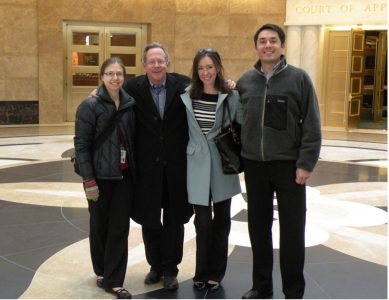
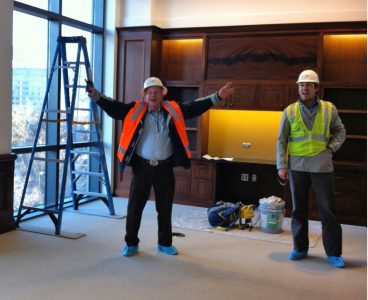
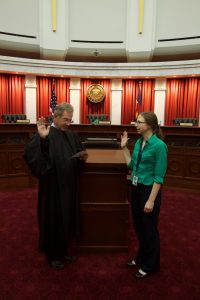
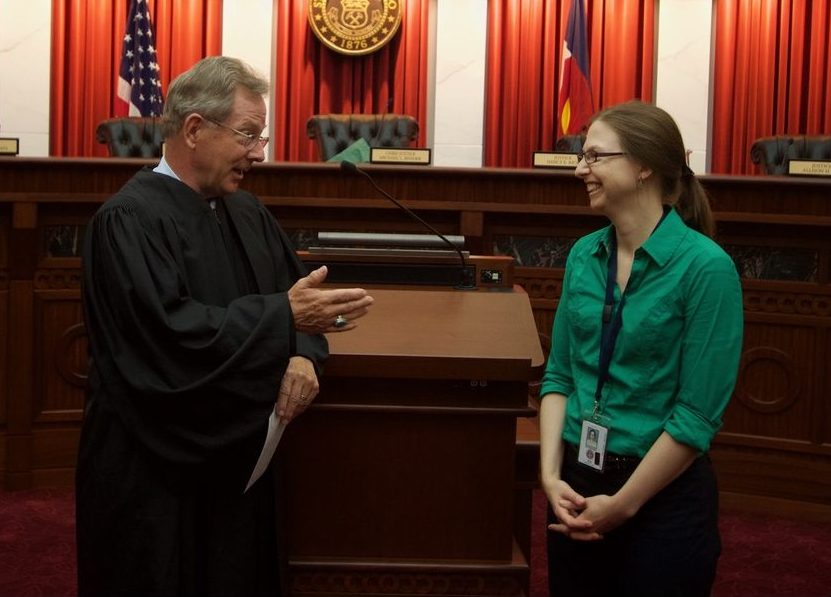
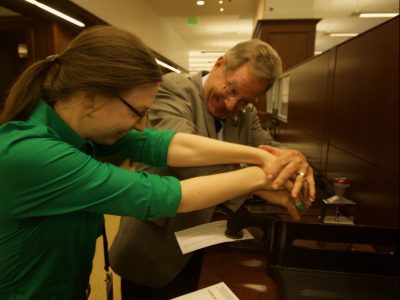
GJH: Grab Justice with both Hands (or What we learned from Justice Hobbs)
Grab justice with both hands:
Dive right in! Don’t wait for an invitation!
Bring your critical thinking skills
and your best intentions.
Time waits for no one.
Be sure to keep sight of what’s important:
Triage and prioritize.
Seek constructive compromise.
Pick your battles wisely.
But go wild on Trivia Fridays!
Dress for success:
Keep your feet grounded (rugged boots can do wonders).
Wear your bolo honorably!
Rock Broncos orange and blue.
Don’t forget to feed your soul:
Enjoy friends, family, and La Fiesta (green chilies are the spice of life)
Order half coffee / half hot chocolate at Dozens (with a Western Slope or a Blue Bonnet Sonnet)
Soak up the mountains, inhale the plains.
Take notice of the cirrus cloud, pray to the nimbostratus.
Embark on adventures, both near and far away.
Hear the poetry that sings in life around you,
And keep a spare pun in your pocket . . . just in case.
You never know when it might come in handy.
Gather friends, new and old, around you.
Reach across the distance to share stories, photos, poems, life.
And remember that justice is a work in progress:
Do your best, and do it proudly.
You are not omniscient, not omnipotent.
All decisions are imperfect,
but we can strive to learn from past mistakes, new information, different points of view,
to course correct, displace injustice with justice
one step at a time
Hand over hand
Hand in hand
Together.
Rest in peace, Justice Hobbs.
* Lauren Dickey (Berkeley Law JD ‘11) is an Assistant United States Attorney at the U.S. Attorney’s Office for the District of Colorado. Daniel Cordalis (University of Colorado Law School JD ‘11) is the Deputy Solicitor for Water Resources at the U.S. Department of the Interior.
Reader Comments
6 Replies to “Losing Justice Hobbs, Western Water Expert and Valued Mentor”
Comments are closed.






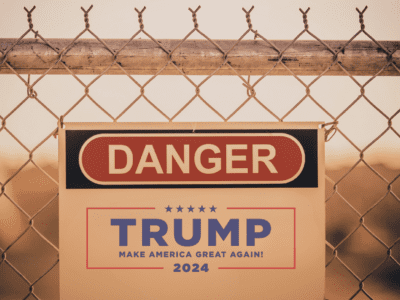
Thank you for a beautiful tribute, Nell.
Thanks, Bob!
What a wonderful tribute to Justice Hobbs who is obviously an important mentor in your career and life Nell. Love, Dad
Thanks, Dad 🙂
Inspirational!
Very informative Nell! He sounds like he made a profound impact to those he encountered, and obviously for you!! It was a moving tribute!!
I applaud you and the time you took to do this!